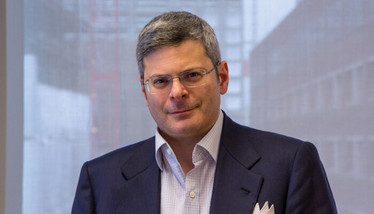For the Love of Continuous!
Sitting Down With… Bernhardt Trout, Raymond F. Baddour, ScD, (1949) Professor of Chemical Engineering, Director, Novartis-MIT Center for Continuous Manufacturing

This article is part of our special focus on "traditional" pharma: The Small Molecule Manufacturer (read more here). You can find more articles from The Small Manufacturer here.

How did the Novartis-MIT Center for Continuous Manufacturing come to be?
The center’s journey began in the early 2000s. Novartis had an interest in continuous manufacturing practices and had been working in collaboration with MIT to help facilitate a transition away from traditional batch manufacturing processes. The Swiss multinational pledged $65 million to MIT to pursue research into what was, at the time, a really novel method of producing drugs.
I had been involved in some of the early talks with the Novartis’ head of manufacturing, and the conversations we had helped dictate the aims of the 10-year partnership that was formed. Everything came together in the mid-2000s, as a team was formed to assess the benefits of collaborating on continuous manufacturing for the wider industry.
What do you consider to be the center’s greatest achievements?
The center has always advocated for a transformation in the industry’s approach to drug development; we believed that a flexible and more automated process would be the best way forward for pharma. We performed the first end-to-end continuous bench process, taking a chemical precursor all the way through to a coated tablet – a key achievement!
Most of our research focuses on developing new technologies and, in more recent years, we have focused on developing crystallization technologies, chemical processes, reactors and separation methods – lines of research that have the potential to lead to even greater benefits for both researchers and commercial companies.
What challenges has the center encountered?
We are all aware of the gap that exists between academic circles and the pharma industry. The center was not an exception to the rule; academics who were used to educating students and pursuing blue sky research had to adjust to working with minds from Novartis – a commercial entity with its own ambitions and priorities. But in the years since the establishment of the center, we have managed to meet our deliverables and help improve perceptions about continuous manufacturing, including its benefits and feasibility in real-world pharma manufacturing. Indeed, there has been a huge transformation in how continuous manufacturing is viewed, with a relatively new conference landscape gaining traction. The skepticism is falling away and companies and regulators are increasingly showing that they are ready to engage on the topic. I think there has been a realization that continuous manufacturing is an inevitability for the future of pharma. How long will it take the industry to fully embrace it? Well, that’s a difficult question to answer. The FDA, EMA and other regulatory authorities have been encouraging the adoption of continuous, but companies need to feel that there is a financial incentive for them to make the transition.
And yet, the pharmaceutical landscape is changing. The market is shifting towards the manufacture of personalized medicines that meet the needs of critically ill patients – and that requires rapid production times. CM has the capacity to streamline the supply chain to help meet this requirement, as it cuts down the time taken to produce a therapy from months to days. Stockpiling issues can also be addressed through CM, which reduces headaches on managing stock that is close to its expiry date.
In a career filled with achievements and awards, which hold the most meaning?
In 2011, I was awarded the Impact Award from the Computational Molecular Science and Engineering Forum of the American Institute of Chemical Engineers (AIChE). Though it was an award presented by a division of AIChE, it was presented to me by my peers – people who I met at graduate school and who went on to become my colleagues at MIT! Being recognized by them was a real honor.
How important has mentorship been for your career?
There have been many people who have been influential and supportive of my career. Arup Chakraborty was a great mentor right from the start of my professional life. When I first met him, he was actually still a junior faculty member, transitioning from research in polymers to work on bringing together immunology and engineering sciences. It inspired me to see someone transfer their skillset from one subject area to another, and I think it pushed me to move from molecular-based engineering to engineering systems.
Charles Cooney, Professor Emeritus at MIT and a luminary in pharma, is another mentor who had a significant impact on my career; he was instrumental in bringing continuous manufacturing technologies to the fore.
Academics are known to preside over their own research-based fiefdoms, but I have been lucky enough to have found support from others with the ambition to move the industry toward the use of more streamlined and efficient technologies. In leading my own research group, I hope to have a similar impact on the careers of those I work alongside.
After finishing my degree, I envisioned a career in science communications. However, life took an unexpected turn and I ended up teaching abroad. Though the experience was amazing and I learned a great deal from it, I jumped at the opportunity to work for Texere. I'm excited to see where this new journey takes me!



















